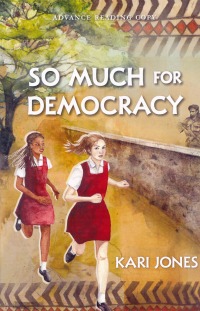| ________________
CM . . .
. Volume XX Number 30. . . .April 4, 2014
excerpt:
Twelve-year-old Astrid and siblings Gordo and Piper must transport their lives from Victoria, British Columbia to Ghana when Astridís father is asked to come to Accra to organize the first democratic election. The familyís move to Ghana proves to be a stressful transition for the family, especially for Astridís mother who is very fearful of the local food, water, and policing soldiers, creating anxiety within their household and preventing the children from enjoying their social freedom previously enjoyed in their Canadian life. Astridís motherís rulesóour first introduction to her anxious, over-protective characteróoutlined in the first chapter: ďDonít talk to anyone you donít know, donít eat anything unless itís made in our kitchen, donít drink anything unless itís from a sealed bottle, donít touch anything, and, most of all, donít go anywhere without askingĒ (p. 1), function to heighten the domestic tension throughout the novel. Astrid is a strong and courageous female character who takes on the role of being a responsible and caring older sibling to Gordo and Piper as their mother continues in her alarming emotional downward spiral, the world around them looms with threats of violence, and the adults keep the children in the dark about what is happening in regards to the man who tries to takeover the Ghanaian government. Jonesí story provides readers with an emotionally captivating look into a familyís anxieties as the unit transitions to life in a new country, the children attend a new school, brother Gordo is struck with malaria, mother fearfully transforms into a new person, and the government is overthrown. Jonesí story richly depicts Astridís strength and commitment to her family as they endure stress and battle sickness and fear. At the end of the story, Jones delivers readers with a ďHistorical NoteĒ which provides background information behind Flight Lieutenant Jerry Rawlingsí coup. The note authenticates this historical time to the young reader as it provides additional context behind Ghanaís road towards the democratic election process. I would recommend So Much For Democracy for elementary classrooms and public library collections because the book educates readers about a familyís emotional situation and social conditions surrounding life in 1979 in Ghana. This book will provide educators the opportunity to have active discussions with their students about the integral role which government, elections, democracy, and freedom play in society. Highly Recommended. Natalie Schembri is studying childrenís literature at The University of British Columbia.
To comment
on this title or this review, send mail to cm@umanitoba.ca.
Copyright © the Manitoba Library Association. Reproduction for personal
use is permitted only if this copyright notice is maintained. Any
other reproduction is prohibited without permission.
NEXT REVIEW |
TABLE OF CONTENTS FOR THIS ISSUE
- April 4, 2014.
AUTHORS |
TITLES |
MEDIA REVIEWS |
PROFILES |
BACK ISSUES |
SEARCH |
CMARCHIVE |
HOME |
